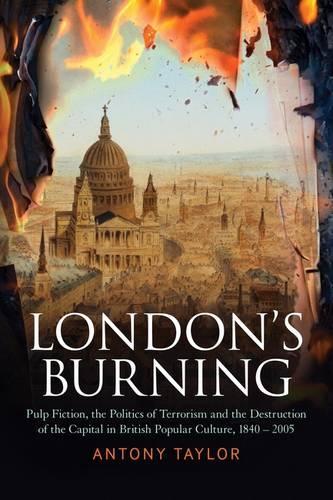
London's Burning: Pulp Fiction, the Politics of Terrorism and the Destruction of the Capital in British Popular Culture, 1840 - 2005
(Hardback)
Available Formats
Publishing Details
London's Burning: Pulp Fiction, the Politics of Terrorism and the Destruction of the Capital in British Popular Culture, 1840 - 2005
By (Author) Dr Antony Taylor
Continuum Publishing Corporation
Continuum Publishing Corporation
26th January 2012
United States
Classifications
Tertiary Education
Non Fiction
Social and cultural history
European history
Popular culture
823.009
Physical Properties
Hardback
272
Width 156mm, Height 234mm
Description
From the early years of the nineteenth century, cultural pessimists imagined in fiction the political forces that might bring about the destruction of London. Periods of popular protest or radicalism have generated novels that consider the methods insurgents might use to terrorise the metropolis. There has been a tendency to dismiss such writings as the lurid imaginings of pulp novelists but this book re-evaluates the contribution of popular fiction to the construction of the terrorist threat. It analyses the high-points for the production of such works, and locates them in their cultural and historical context. From the 1840s, when a fear of Chartist insurgency was paramount in the minds of authors, it moves through the anarchist thrillers of the 1890s, considers writers' fears about Bolshevik revolution in the East End of the 1920s and 1930s, explores fears of Fascism in the inter-war years, and assesses the concerns with underground counter-culture that feature in the thriller literature of the 1970s. It concludes with a re-evaluation of the metropolitan background to the figure of the Islamist terrorist.
Reviews
London's Burning makes for fascinating reading. With originality and verve, Taylor charts the recurrent image in popular fiction of London on the verge of collapse. London is portrayed as a city besieged by subterranean forces - by dynamite-throwing anarchists, Bolshevik conspirators, Fascists, Irish republicans and most recently by Islamist terrorists -- James Epstein, Distinguished Professor of History, Vanderbilt University, US
Ideas no less than people have a social history. From the age of the young Queen Victoria to 7/7, this is a history of London seen through the hundreds of sensational and dystopian texts that have provided a mordant commentary on the metropolis. Antony Taylor has written an alternative social history of the capital, within which the threat of terrorism is the only constant in obsessional narratives of disarray, disorder and decline. All who think they know metropolitan or British history, politics or culture should read London's Burning. -- Malcolm Chase, Professor of Social History, University of Leeds, UK
Author Bio
Antony Taylor is Senior Lecturer in History at Sheffield Hallam University, UK. His research interests are in the field of nineteenth century popular political culture. He has written and published widely in the area of British post-Chartist politics, radical historical memory, republicanism, and the print culture of the radical underworld.
